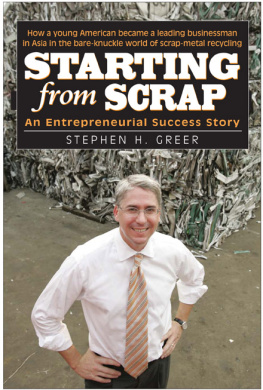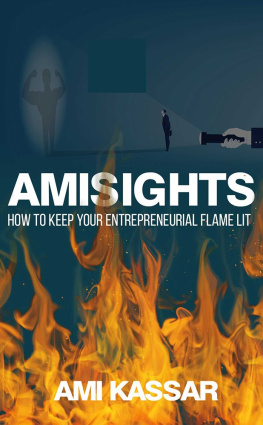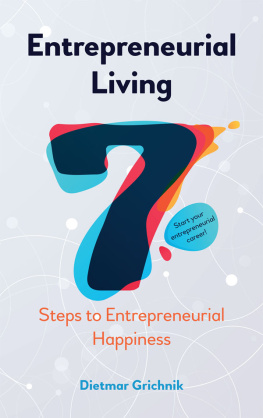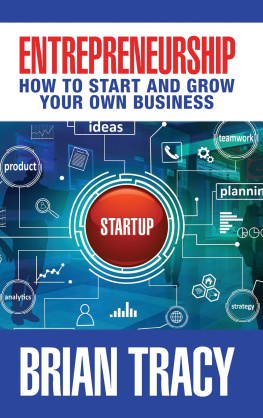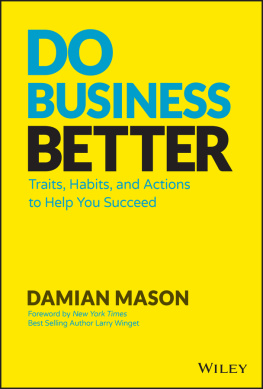Stephen H. Greer - Starting from Scrap: An Entrepreneurial Success Story
Here you can read online Stephen H. Greer - Starting from Scrap: An Entrepreneurial Success Story full text of the book (entire story) in english for free. Download pdf and epub, get meaning, cover and reviews about this ebook. year: 2010, publisher: Burford Books, genre: Home and family. Description of the work, (preface) as well as reviews are available. Best literature library LitArk.com created for fans of good reading and offers a wide selection of genres:
Romance novel
Science fiction
Adventure
Detective
Science
History
Home and family
Prose
Art
Politics
Computer
Non-fiction
Religion
Business
Children
Humor
Choose a favorite category and find really read worthwhile books. Enjoy immersion in the world of imagination, feel the emotions of the characters or learn something new for yourself, make an fascinating discovery.
- Book:Starting from Scrap: An Entrepreneurial Success Story
- Author:
- Publisher:Burford Books
- Genre:
- Year:2010
- Rating:5 / 5
- Favourites:Add to favourites
- Your mark:
- 100
- 1
- 2
- 3
- 4
- 5
Starting from Scrap: An Entrepreneurial Success Story: summary, description and annotation
We offer to read an annotation, description, summary or preface (depends on what the author of the book "Starting from Scrap: An Entrepreneurial Success Story" wrote himself). If you haven't found the necessary information about the book — write in the comments, we will try to find it.
Starting from Scrap: An Entrepreneurial Success Story — read online for free the complete book (whole text) full work
Below is the text of the book, divided by pages. System saving the place of the last page read, allows you to conveniently read the book "Starting from Scrap: An Entrepreneurial Success Story" online for free, without having to search again every time where you left off. Put a bookmark, and you can go to the page where you finished reading at any time.
Font size:
Interval:
Bookmark:
I must first say that had I known how much work goes into writing a book and getting it published, I probably never would have started. Without the constant support and encouragement of my family and friends, I would not have completed this project.
In particular I would like to thank my editors. A brilliant young gentleman named Matt Huttner put in many hours of work and was extremely helpful when it came to structure, while brutally slashing and burning around five hundred pages of text into what I hope stands today as a cohesive and fast-flowing story. He also relished the debate over word choice as we savored scotches and cigars. His fingerprints are all over this text. Alexandra Shelley, a consummate professional and Yale professor, taught me the painful phrase killing your darlings in the ruthless pursuit of eliminating superfluous or irrelevant stories as well as enforcing the maxim show dont tell. I fought hard in the beginning but in the end adopted most of her suggestions and admit that she was right.
I would also like to thank my many friends who painstakingly read my early text and offered suggestions and encouragement: Mom, Dad, my brother Andy, Ian Edgar, Justin Kent, John Vargis, Allen Dorcas, Tom Leander, Richard Huttner, Bernie McGuire, George Jackoboice, Mark Walsh, Mary Scott, Bill Duryea, Lisa Siu, James Chen, Raphael Le Masne, William Pfeiffer, Graydon Joseph, and Roy Kuan.
Great thanks and gratitude should be assigned to Jed Lyons, my mentor in this project, who told me early on, There is a book in here somewhere, but you have a lot of work to do. He was right. That was two years ago. He also generously offered up all of his contacts in the publishing and editing world as well as many sage editorial comments. Again, this project would not have been completed without him, and I am very grateful.
I also appreciate the support and encouragement of my publisher, Peter Burford. Finding the right publisher is a real challenge, and I am confident I found a very good one. Thank you for your confidence.
Finally, I save the greatest acknowledgment for my wife, Mei, who is the lead character in this book, my soul mate, and my biggest fan. Though English is her third language, her commonsense input was uncannily helpful and can be found in most chapters.
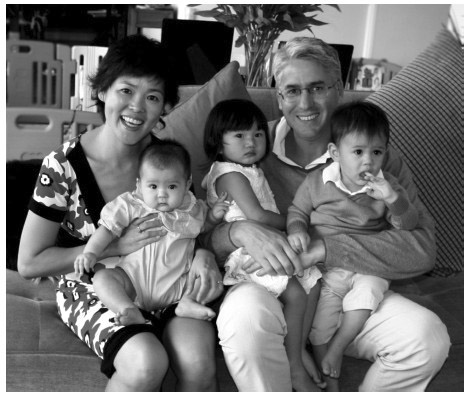

THE LAY
OF THE
LAND
T he bright neon lights of predawn Hong Kong jumped out from the narrow streets and alleyways, embracing the plane as we banked in low at a surprisingly sharp angle. Kai Tak Airport was carved out of the middle of the city, a single-lane runway protruding into the harbor. As the wheels touched down with a heavy jolt, reality set in. I was twenty-four, arriving in Asia for the first time with no job or specific plan other than to try to capitalize on the economic boom that was unfolding in the most populated part of the world.
Up until six months ago, Id been working as a financial analyst in the European headquarters of MacDermid Inc., an American chemical company based in a small German town, and had been on a long, slow track toward becoming a financial controller. Fed up, I had left Germany in hopes of finding a power job on Wall Streetonly to see those hopes crushed when America slumped into the recession of 1992. But there was a silver lining. As Wall Street and Main Street slashed at their workforces and masses of young graduates joined the ranks of the unemployed, all the business journals were writing of the great fortunes being made in the burgeoning Far East. Serendipitously, I had also been reading James Clavells novel Noble House, a highdrama story of intrigue, business deals, and romance, all exotically played out in modern-day Hong Kong.
I was now simultaneously running away from failure and running toward something unknown but exciting. A recession in America, some media hype, and a novel Id picked up randomly had sent me on a journey around the world.
As our plane taxied to the docking station, I was overcome by a pungent odor. A pretty flight attendant, acknowledging my reaction, explained that Hong Kong translates into English as fragrant harbor; this sweet scent was due to millions of people flushing untreated sewage into the sea.
It was six thirty in the morning and the airport was packed. Representatives of just about every nation in the world were milling aboutAfricans wearing colorful robes, Indians in saris, Chinese, Europeans, and Americans. I had always naively considered that Asia was a single place and Asians were one people, but I was now starting to appreciate the widely varying features, skin tones, builds, and fashions. I was fascinated by the different faces and studied them all as I waited in the long immigration line. Finally I got to the head of the queue. The officer took my passport and eyed me briefly, flipping through the pages. He stamped it, kerchunk, and passed it back without expression. I flipped to the page and looked down: FEB. 22, 1993HONG KONG.
Baggage in hand, I approached a set of large sliding doors. As they opened, a crescendo of chatter from beyond enveloped me, only to leave me ensconced in silence a moment later as they smoothly slid closed. Taking a deep breath, I staggered through the doors and descended into a sea of people searching for their connections amid a snarled traffic jam of carts. Strange faces stared at me pointedly as I inched, bumped, and jostled through the mob, totally overwhelmed.
I exited the frigid terminal, a suffocating wave of humidity fogging my glasses. I then propelled myself blindly past the taxi line, a herd of people pushing and maneuvering their way along caged aisles like cattle in a slaughtering pen. Avoiding the crush and keeping to the right, I searched for the bus stands per the instructions of Topher Neumann, a friend of a friend who had agreed to put me up when I arrived. I eventually found the A10 that would bring me to Causeway Bay, our designated meeting place.
The thirty-minute journey felt like five as the hydraulic doors gasped open and I was ejected onto the busy streets in front of the Lee Garden Hotel. My fellow passengers dispersed and I stood alonesuitcase and black leather briefcase at my feet, absorbing the tropical humidity on this unseasonably warm day, sunlight dancing off my eyeballs. As I searched the crowd with squinted eyes and a jet-lagged brain, I tried to call up an image of Topher from my vague high school memories and considered for the first time: What happens if he doesntshow up? There was no plan B. Id flown here from my hometown of Pittsburgh on a one-way mileage ticket I had scrounged off my father.
The crowds continued to amass and the temperature steadily rose as I kept searching for Topher with one eye on my bags. Finally a tall white guy with tousled brown hair wearing a T-shirt, shorts, and flipflops came loping through the crowded streets, his head bobbing above the locals. He was coming straight for me, the sweaty white guy holding a blue blazer. I smiled.
Welcome to Hong Kong! he announced exultantly. You made it!

I followed Topher through the streets to his apartment. I had imagined that in Hong Kong, a British colony, expats lived in old colonial buildings, where they sat on balconies in rattan chaise lounges under whirling ceiling fans, avoiding the heat while sipping cocktails and exchanging the news of the day. That image started to dissolve as Topher led me through the throngs of people busily worrying around Causeway Bay, one of the most densely populated parts of Hong Kong and in fact the world. We then meandered through a couple of alleys and approached a well-weathered fifteen-story apartment building that took up most of one city block. The entrance was a long hallway coated with peeling white paint and lined with hawker stands selling refrigerated drinks alongside interesting-looking tubs and bins of food. Inhaling a musty mix of fish, cooked meat, and automobile exhaust fumes, I walked by a bucket of shelled raw oysters sitting on the floor, a pile of goop in a plastic pail. I was mesmerized by the sights, sounds, and smells. The locals gawked at us as if we were from another planet while we heaved my bag down toward the elevator. The building was not appealing at all on the outside, but the ninth-floor flat was roomy and comfortable. I learned that the older buildings like this one are much more spacious and convenient than the newer ones built when land was very dear during the 1970s and 80s property boom, a trend that has continued until today. Topher, presumably with the permission of his flatmates Ian Edgar and Bernie McGuire, had invited me to stay on their couch until I got settled. We sat together sharing a coffee. Bernie was a tall, good-looking Texan who worked in finance for a Chinese chemical company. Ian was a classic New England prep school kid with fair skin and reddish blond hair who worked for the American Chamber of Commerce.
Font size:
Interval:
Bookmark:
Similar books «Starting from Scrap: An Entrepreneurial Success Story»
Look at similar books to Starting from Scrap: An Entrepreneurial Success Story. We have selected literature similar in name and meaning in the hope of providing readers with more options to find new, interesting, not yet read works.
Discussion, reviews of the book Starting from Scrap: An Entrepreneurial Success Story and just readers' own opinions. Leave your comments, write what you think about the work, its meaning or the main characters. Specify what exactly you liked and what you didn't like, and why you think so.

